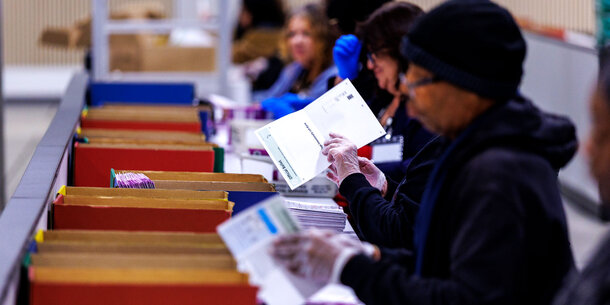Months of unprecedented actions signal that the Trump administration is pursuing a concerted strategy to undermine the next election. One part of that effort is an ongoing attempt to collect voter files from many states.
In May, the Justice Department began demanding copies of states’ voter registration databases, including sensitive information such as driver’s license numbers and the last four digits of voters’ Social Security numbers. It has been publicly reported that the DOJ has requested information or meetings about election administration from at least 33 states, and it has asked at least 27 of those states for copies of their voter registration lists. The actual number of requests may be higher. The Brennan Center is using public reporting to track the DOJ’s requests and states’ responses.
Few states have sent the DOJ their voter files, and those that did — at least 11 — seem to have provided only the publicly available versions of their voter files, which vary by state but may include information such as voter names, addresses, partisan affiliations, and voting history. In early August, the DOJ stepped up its efforts to collect voter files by sending a new set of letters — this time signed by the head of the Civil Rights Division — reiterating its demands for copies of the full voter registration databases, including driver’s license numbers and Social Security numbers.
While it is unusual, it is not unprecedented for the DOJ to send a mass mailing to states with questions about election administration. Requesting voter registration databases from such a large number of states, however, is unprecedented. This bid by the federal government to gather voter records from across the country is cause for concern and poses risks to voters and election officials.
First, the federal government does not play any role in maintaining voter rolls. States and local governments run our elections, and as part of this responsibility, state and local election officials maintain voter files, which includes adding newly registered voters and removing voters who become ineligible (for example, because they move). The DOJ’s demands for the voter files are one element of the attempted federal takeover of federal elections. If its requests succeed, the department could amass a federal database of personal information about every registered voter in the country. The Trump administration may use such a database to further promote false claims about election fraud, target political opponents, or attempt to force states to remove voters from the rolls based on incomplete information. This vast collection of personal information could also easily be disclosed or misused by unauthorized individuals and become a prime target for hackers.
Second, the DOJ’s demands are not justified as an attempt to enforce federal voting laws. Instead, President Trump’s March 2025 executive order on elections — which is currently facing a number of legal challenges — directs the federal government to collect voter files from all the states. Under the Civil Rights Act of 1960, which the DOJ’s August letters cite as the basis for its demand for the voter files, the department is permitted to request records “relating to any application, registration, payment of poll tax, or other act requisite to voting in such election.” However, the law requires that the DOJ provide a “basis and purpose” for the request. Many of its letters to states do not appear to satisfy this requirement.
For example, some of the letters claim that the department needs access to voter files to ensure the state is complying with the National Voter Registration Act, which requires states to regularly conduct list-maintenance programs to remove from the rolls voters who have moved, died, or otherwise become ineligible. This rationale falls short, however, as a single snapshot of the voter rolls doesn’t provide enough information to evaluate a state’s list-maintenance practices.
In other requests, the DOJ claims it is verifying state compliance with the Help America Vote Act, which requires those in charge of voter registration to request certain information from voters during that process, such as driver’s license numbers or the last four digits of their social security numbers. But again, looking at a voter file alone would not allow the DOJ to assess whether jurisdictions requested certain identifying information at the time of registration.
Finally, the DOJ’s information requests may also violate federal and state privacy laws. The Privacy Act regulates federal access to individuals’ data records, with a particular concern for the treatment of information related to activity protected by the First Amendment. Even if there were an exception in the Privacy Act that permitted the DOJ to collect data from state voter rolls — which is not clear — the government would still have to follow various procedures before doing so, such as posting a notice in the Federal Register and providing an opportunity for public comment. The DOJ has not complied with these requirements.
Further, many states have laws that would prohibit them from disclosing some of this sensitive voter information, which a few states have noted when responding to federal officials. The DOJ would need to obtain a federal court order to force states to violate their own privacy laws, and it has failed to do so.
The executive branch has no authority to run our elections, nor any authority to compile a massive database of voters’ personal information. The DOJ’s efforts threaten individuals’ privacy and constitute yet another way in which the federal government is seeking to interfere with states’ constitutionally mandated power to conduct elections.



